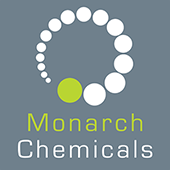Water treatment chemicals play a crucial role not just in ensuring safe drinking water, but also in maintaining the integrity of industrial water systems. These chemicals are used to purify water, disinfect, adjust pH levels, and inhibit corrosion in pipelines and closed-loop systems. Whether managing municipal water supplies or industrial cooling systems, understanding the function of these chemicals is vital for preventing equipment damage, improving efficiency, and ensuring water safety. As a UK-based bulk chemical distributor, we supply a wide range of products to meet your water treatment needs.
1. Citric Acid
Role: Scale remover
How It Works: Citric acid is widely used in water systems to remove scale and mineral deposits, which can reduce efficiency in piping and machinery. It chelates (binds) with metal ions, breaking down and dissolving scale build-up, ensuring smooth water flow and system longevity.
2. Ferric Chloride
Role: Coagulation
How It Works: Ferric chloride is a powerful coagulant that helps bind fine particles in water into larger clumps (flocs). These flocs can then be easily removed through sedimentation or filtration. It is particularly effective in wastewater treatment for removing phosphates and suspended solids.
3. Ferric Sulphate
Role: Coagulant
How It Works: Similar to ferric chloride, ferric sulphate acts as a coagulant, making suspended solids stick together, allowing them to settle more easily. It is especially effective in the removal of colloidal particles and for treating industrial wastewater.
4. Hydrochloric Acid
Role: pH Adjustment & Descaling
How It Works: Hydrochloric acid (HCl) is commonly used in water treatment to lower the pH of alkaline water. It also serves as a descaling agent, breaking down lime scale and other deposits that form in boilers, heat exchangers, and pipes, maintaining system efficiency.
5. Hydrogen Peroxide
Role: Oxidizing Agent
How It Works: Hydrogen peroxide is a powerful oxidizing agent used to disinfect water by breaking down organic matter, bacteria, and other harmful contaminants. It decomposes into oxygen and water, leaving no toxic residues, making it a greener alternative to some other disinfectants.
6. Phosphoric Acid
Role: Corrosion Inhibitor
How It Works: Phosphoric acid is used to prevent corrosion in metal pipes and tanks by forming a protective layer of phosphate salts. It is particularly beneficial in systems where water is highly corrosive, extending the lifespan of the infrastructure.
7. Poly Aluminium Chloride (PAC)
Role: Coagulant
How It Works: PAC is one of the most efficient coagulants for water treatment. It helps remove suspended solids and organic materials by promoting the formation of larger flocs, which can then be filtered out. It works over a wide pH range, making it versatile for different water conditions.
8. Sodium Chlorite
Role: Precursor for Chlorine Dioxide
How It Works: Sodium chlorite is used to generate chlorine dioxide, an effective disinfectant. Chlorine dioxide is ideal for killing bacteria and viruses, and is often used in municipal water treatment for its powerful oxidizing properties without forming harmful chlorination by-products.
9. Sodium Hypochlorite
Role: Disinfectant
How It Works: Sodium hypochlorite , commonly known as bleach, is one of the most common water disinfectants. It releases chlorine, which eliminates bacteria, viruses, and other harmful pathogens, ensuring water is safe for use.
10. Sodium Molybdate
Role: Corrosion Inhibitor
How It Works: Sodium molybdate is used to prevent corrosion in water systems by forming a protective layer over metal surfaces. This helps avoid rust and corrosion, particularly in cooling towers and boilers, improving the longevity of water treatment equipment.
Conclusion
Water treatment is essential for maintaining safe, clean, and efficient systems, whether for industrial use or public consumption. Each chemical plays a vital role, from purifying and disinfecting to preventing corrosion in complex industrial processes.
To learn more about the chemicals we offer, visit our product pages or contact us directly to discuss your specific water treatment needs.





